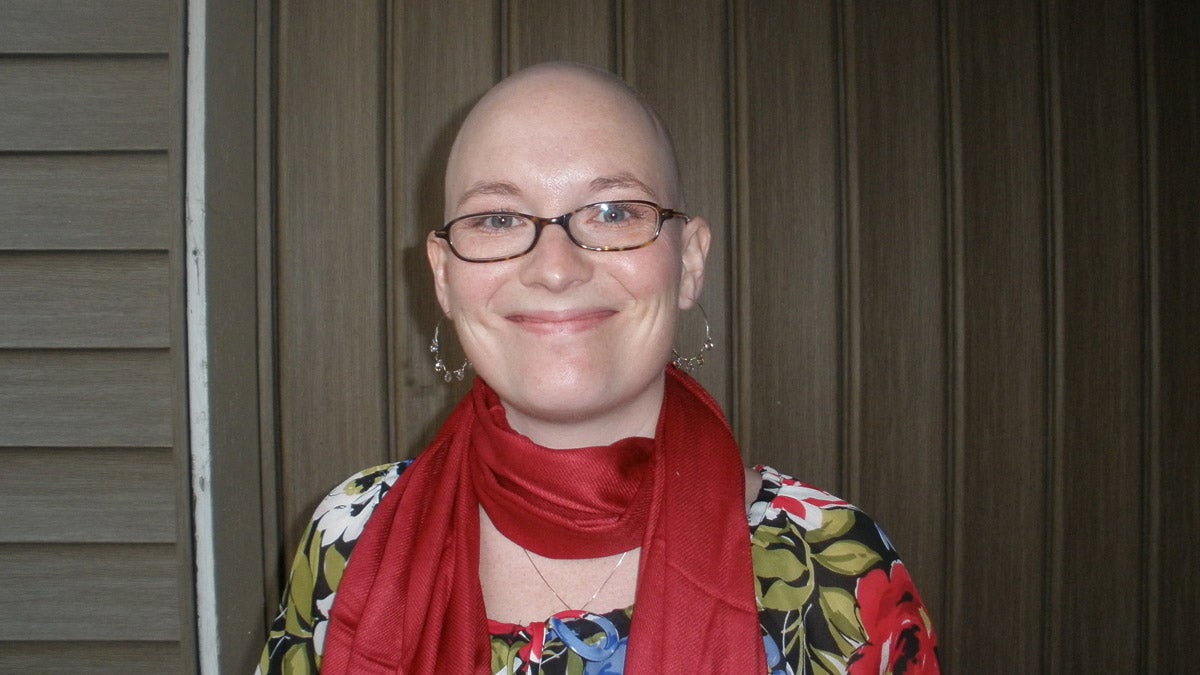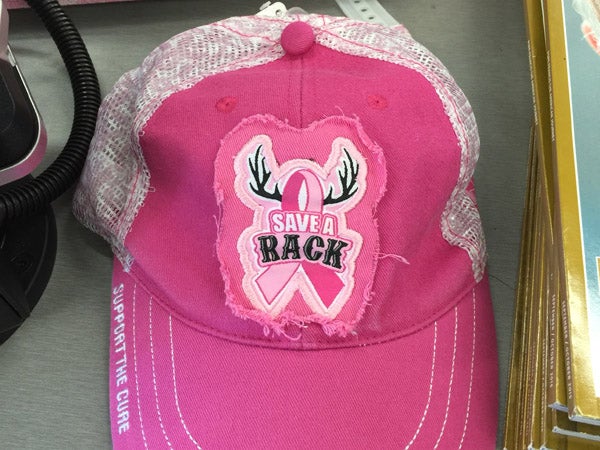Why some women don’t like the term breast cancer ‘survivor’
Listen
Jennifer Boiler during her treatment for breast cancer. (Courtesy of Jennifer Boiler)
As the world around us turns pink in October, thousands of people will take to the streets to raise money, to urge women to get mammograms and to celebrate those who are ostensibly beating cancer – the survivors.
For many, the word survivor spells hope and optimism. But some women who have had breast cancer just don’t like the term. Perhaps that seems like a minor concern in the face of such a daunting illness. However, words and labels are powerful, and sometimes, finding a term that feels right can be an important part of defining oneself, post-cancer.
The moment when you know things won’t be the same
Long before there’s even a thought about what you’ll call yourself once you get through a life-threatening illness, there’s a moment that changes everything.
For Jennifer Boiler, that moment came in 2011, when she found a lump in her breast. She was 34 years old, and nursing her son at the time. Her doctor thought it was likely a blocked milk duct, or a cyst, and she went to get it drained. “The surgical oncologist went to do what’s called an aspiration, but it wasn’t a fluid-based cyst.” Jennifer says that was the moment she knew she had cancer.
“I watched his face, his visage change, and I thought ‘something is happening.’ He tagged the lump and said you will be having more imaging.”
When she returned back to her car, her husband and two young children were eating hot dogs, and she couldn’t tell her husband what had happened. She felt different – witnessing a moment of normalcy knowing her life would soon change drastically.
Choosing your own narrative
Boiler got through a double mastectomy, chemotherapy, radiation and breast reconstruction that she remembers as incredibly painful. It’s hard to imagine any of this now since she looks perfectly healthy, with a bob of red hair and colorful earrings, and has a busy counseling practice in Haddonfield, New Jersey.

Jennifer Boiler with her family. (Courtesy of Jennifer Boiler)
Once she got better, she wondered how she’d refer to her experience. “I looked up the term survivor and it means lived through something that would have otherwise been deadly,” she recalled. “Synonyms are leftovers, bits and pieces, remnants.”
She felt this didn’t describe the pain, the fear and anxiety, or the fact that for long stretches, she couldn’t pick up her two children. She says her cancer nearly wrecked her otherwise strong marriage. So, she chose another term.
“I call myself cancer-resilient,” she said. “I actually have that word tattooed on my thigh – because I am, and survivor is not just me, it’s my whole family. We’ve all had to adapt.”
Boiler recently participated in a study with two researchers at Rutgers University in Camden, New Jersey who were interviewing women who had had double mastectomies. The study focused on decision-making and medical evidence, but during those conversations, women brought up their feelings about the term survivor. So researchers Trish Suplee and Bonnie Jerome D’Emilia decided to add this topic into their interview questions.
“When do I become a survivor – when I had the surgery, is it five years out? It’s a very confusing term,” said Trish Suplee. “One woman said, ‘If I die from something else, then you can call me a survivor,'” added Bonnie Jerome D’Emilia, the other researcher. Both teach in the school of nursing at Rutgers Camden.
“Some went into the fact that they didn’t have it as bad as others, therefore they didn’t consider themselves a survivor. Another reason was that they feel like they are still living it, and talked about thriving versus being a survivor,” said Suplee.
There may also be a bit of superstition involved, said D’Emilia.
“They felt that by owning the word survivor they were maybe tricking themselves into believing that the cancer had gone away, and all but maybe one of the women in our study, they truly believed that they had not been cured.”
They found that how women referred to their experience was a very individual choice – and often became part of reclaiming their lives after cancer.
If not a survivor, what do you call yourself?
If you don’t like the term ‘survivor,’ you do run into a bit of a naming problem. Survivor is short. It’s snappy. Helen Cooke, another woman who participated in the Rutgers study doesn’t love it, but she also doesn’t really like some of the alternatives – for example, warrior. “The flip side of that might imply that somebody who doesn’t make it didn’t fight hard enough, didn’t want it, and I know for a fact that’s not the case,” she explained.
And when her brother called her a hero on facebook, she felt a flattered, but also thought it was too big of a word. “I did not run into a burning building to save a child, I’m simply dealing with my reality, so right now my body is the burning building and I don’t have the option.”
Instead – she likes to keep things simple. “I refer to myself as Helen. I’m someone who has had breast cancer, and there’s a litany of 79 other descriptors that would apply to me, so that’s one of them.”
Helen Cooke is a consultant. She’s an animal lover. She is a New Jersey resident. Just to name a few other descriptions.
Both Helen Cooke and Jennifer Boiler say they believe awareness and fundraising is very important. They also don’t mind other women using the term survivor to describe themselves. They just feel like it’s not right for them. But there’s one thing that does drive Jennifer Boiler nuts. She was at a grocery store recently and noticed a shelf filled with breast cancer awareness gear. She noticed a pink trucker hat with a bit of camouflage on it, and antlers.

Jennifer Boiler took a picture of this hat in a grocery store because she found it offensive. (Courtesy of Jennifer Boiler)
“It said ‘Save a rack’ and I took a picture,” she recalled. “The store manager was looking at me, and my husband was hiding his face, but I thought I need to see this and do something about it.” Jennifer Boiler believes cutesy slogans like this one, or “I’m a boob man” completely miss the point. “That’s so far removed from what this is about. It’s not about saving a woman’s breasts, it’s about a woman’s life. The rack, the boobies – that’s not it. That’s not it at all.”
WHYY is your source for fact-based, in-depth journalism and information. As a nonprofit organization, we rely on financial support from readers like you. Please give today.




